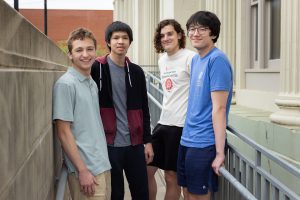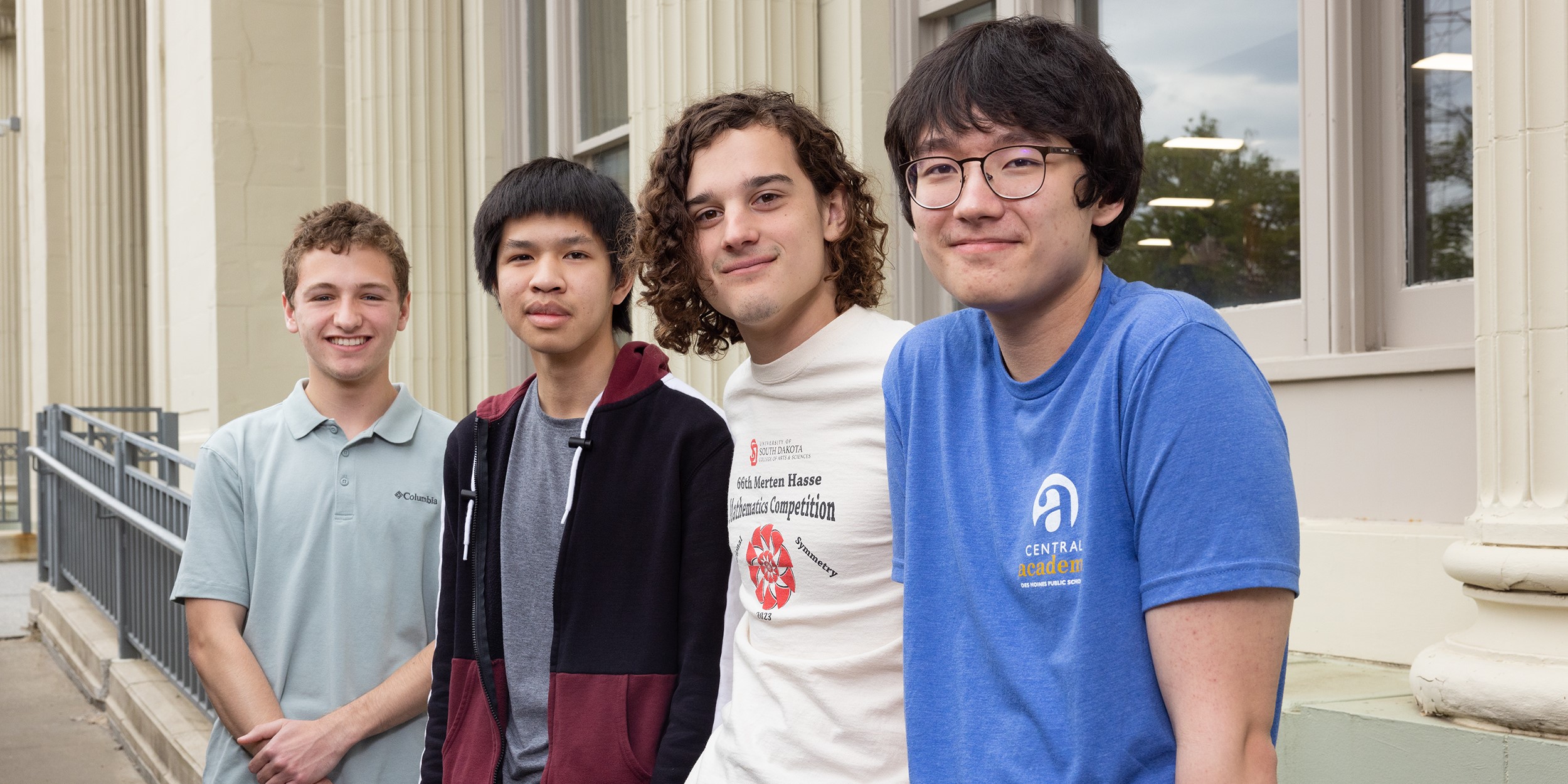
Pictured left to right: Alec Fialkov, junior; Maverick Baccam, senior; Ryan Trujillo, senior; Maximillian Roach, sophomore.
Four friends and high school math standouts from Central Academy have earned a walk onto the world stage. Junior Alec Fialkov, seniors Maverick Baccam and Ryan Trujillo, sophomore Maximillian Roach, and their advisor, Michael Marcketti, make up one of only two U.S. teams moving forward to represent our country in the 9th Annual International Mathematical Modeling Challenge (IM2C).
“The selection is exceptionally prestigious,” said Marcketti. “Teams have the onerous task of researching, developing a model, and writing a paper collaboratively under time constraints.”
The entry written by the four young mathematicians will now be judged against similar work submitted by high school students around the world. The team will be notified about the results in June.
We caught up with the Des Moines math prodigies for a photo and they answered a few questions about how they became interested in math, what keeps them motivated, and advice they have for other students interested in taking on this challenge, and for DMPS math teachers.
What first interested you in math?
“I think my first interest in math, but more broadly in STEM as a whole, has to come from watching MythBusters when I was younger. Everything about that show was super exciting to me, and I loved their practical (albeit many times impractical) application of physics and engineering. Also, when I was younger, math was introduced to me in the form of puzzles, so it has always been fun for me.” – Alec Fialkov
“I began studying math at a young age, so by the time I reached high school I had developed a particularly strong interest. However, my passion for mathematics really grew when I joined the Advanced Math Problem Solving class at Central Academy. In the class, I was exposed to competition math, which I found to be much more interesting and completely different from the math that we ordinarily studied in school.” – Maximillian Roach
“I began my involvement in competition math in my sophomore year and took part in my 1st math modeling contest the following year. I was instantly enamored with the freedom of solving complex issues with whatever method I could think of. Math goes beyond numbers and symbols, it’s a powerful exercise in problem solving and critical thinking.” – Ryan Trujillo
“My interest in math first stemmed from adolescence, mainly due to it being the easiest subject for me at the time. I found out at a young age that I was “gifted” at math, or I was simply able to comprehend it better than my classmates. Whether that says more about me or the education I was provided is up for debate, but I digress. I wasn’t that good at many of the other subjects, so I stuck with math as my main subject throughout middle and high school, eventually ending up where I am today.” – Maverick Baccam
What continues to grow your interest in math?
“Watching current progress in space exploration along with other technological advancement in areas such as electric cars and medicine excites me greatly. Every time I see a new article about SpaceX’s newest triumph, or about breakthroughs in the use of Nitinol for stents, I am inspired to absorb as much math knowledge as I can so that I can eventually help to fuel innovation in one of these fields.” – Alec Fialkov
“At the moment, the thing that continues to grow my interest in math is my desire to improve my problem-solving abilities. Mathematics always offers a stimulating challenge, and it is the prospect of someday being able to solve problems that I currently find difficult that motivates me to put more and more time into studying.” – Maximillian Roach
“As I move onwards to college, math remains on my horizon. Math modeling has opened the floodgates, so to speak. I’ve discovered that math is not limited to the calculus we learn in the traditional classroom. Through programming, discrete logic, and more, we can solve unimaginably impactful and complex issues in the real world. This diversity is what continues to grow my interest in the field.” – Ryan Trujillo
“Not much honestly, at least on the theoretical side, I don’t have as much enthusiasm towards the betterment of my mathematical skills as I used to. However, I’ve since tried to branch out from learning math simply for the sake of mathematics, but to apply the things I’ve learned to the real world. I’m planning on majoring in some form of engineering when I go into college and have found a sort of primitive joy in seeing my calculations work in a real-world setting, in better words, physics. So although I might not be pursuing math as a career in the future, I’ll still continue to develop my skills and discover what wonders math holds for the future. – Maverick Baccam
What advice would you share with aspiring student-mathematicians?
“Make mistakes, and never stop asking questions. Since elementary school I have been that one kid at the front of the class who always had their hand up, asking tangentially related questions and sidetracking teachers. I have also been that one kid who groans loudly after being handed their test back, realizing the obvious mistake I made only after the test was graded. My mistakes have been my greatest learning moments, and they don’t seem to be disappearing any time soon.” – Alec Fialkov
“For aspiring student-mathematicians, I would recommend focusing more on your interests in math than pursuing mathematical achievements. If a student is only focused on pursuing accomplishments, they’ll feel anxiety over their abilities and begin to lose their love for the subject. However, if they are more focused on pursuing the topics they are passionate about, I think they’ll profit much more from the time they put into studying math.” – Maximillian Roach
“Keep trying, even when things go wrong. Have the courage to find solutions for yourself, because what we learn in the classroom is not necessarily the only way. Get engaged in extracurriculars if you can. By far and away, math modeling contests have been the most fulfilling academic experiences of my high school career.” – Ryan Trujillo
“Honestly, I feel like I’m a bit underqualified to share anything with any other mathematicians in the making. There isn’t anything too mathematical that I could share with anyone serious about math. I doubt vague esoteric knowledge would do well either. So, the only thing I’ll say is have fun with it. As gruesome as the competition was, I can say, and maybe my teammates as well, that I had a lot of fun doing it with them, and their company made the competition a lot more bearable. Because in the end it’s a team competition and bouncing ideas off each other is the best way to foster growth and learning.” – Maverick Baccam
What would you like to share with DMPS math teachers?
“To all of the DMPS math teachers, you all have one of the hardest and most crucial jobs out there. You are tasked with teaching the next generation the tools and skills they will need to conquer climate change, space exploration, and even just their day-to-day lives. Many times, those who you teach are apathetic at best, and entirely uncooperative at worst. Yet it is because of your prevailing passion and love for the subject you teach that my team has been able to accomplish what we have and may strive to achieve even greater. Thank you.” – Alec Fialkov
“For DMPS math teachers, I would advise that they make efforts to inspire and push their students mathematically, especially those who they identify as having a particularly strong interest.” – Maximillian Roach
“To them, I would like to extend a sincere thank you. Your classrooms and infectious enthusiasm have shaped me into the student I am today, inside and outside of school. Your lessons I will carry with me into college and beyond, and I have no doubt they will continue to guide me throughout life.” – Ryan Trujillo
“I’d like to thank all the DMPS math teachers for making this a possibility. They’ve fostered a generation of mathematicians brimming with talent, ones who aren’t afraid to fail and welcome adversity at every turn. It is thanks to them that we developed the problem solving and mathematical thinking portrayed in our model. All in all, we couldn’t have done this without them, and I’d like to personally credit this achievement to the entire DMPS math department.” – Maverick Baccam
Advisor Marcketti, noting the joy he feels watching students succeed at enormously challenging tasks, had his own advice for students to have courage and enjoy their successes.
“To all students, be they mathematicians or not, I would advise you to let your joy of trying a challenge be greater than your fear of failing and you will be rewarded time and time again,” said Marcketti.
The International Mathematical Modeling Challenge (IM2C) promotes the teaching of mathematical modeling and applications, based on the firm belief that students and teachers need to experience the power of mathematics to better understand, analyze, and solve real–world problems. The challenge began in 2015 in the spirit of promoting mathematical modeling in classrooms across the globe.





